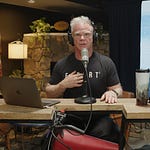Want to join Todd live on video at 8am PST Monday-Friday? Subscribe to be apart of the live show and have access to exclusive content on Substack!
Episode 2,265 - The Mockingbird Media’s Latest Script (AUDIO BEST-OF)
The video version of this episode is broken into three parts for Youtube and will be available within 24 hours of the audio show becoming available. Subscribe to our Youtube channel to receive updates on when these clips are posted!
Episode Links:
DOGE FROM MY DODGE: I'm calling for the suspension of federal funds to Sound Transit pending a full federal audit, and its governance structure changed to be answerable to the people that it taxes. When the CEO can be appointed to a $675,000 a year job by his political allies with no transparency, despite a record of failure, an investigation is warranted
GROK Summary: New York State and City combined have likely spent between $9 billion and $12 billion since 2020 on services for undocumented immigrants and asylum seekers, with NYC’s costs (projected to hit $10–12 billion by mid-2025) and the state’s $2.1 billion EWF and $2.4 billion FY 2025–2026 budget as the main drivers. Exact figures are hard to pin down due to overlapping budgets, emergency spending, and untracked costs. For more details, check the New York State Comptroller’s Asylum Seeker Spending Report at
https://www.osc.ny.gov
or NYC’s budget updates at
https://www.nyc.gov
https://www.osc.ny.gov/reports/asylum-seeker-spending-report
Unfinished Foster Care Computer System: Since 1993, the State Office of Children and Family Services has spent $351 million on a computer system to track children in foster care, which remains incomplete. This prolonged project has been cited as a significant example of administrative inefficiency and wasteful spending.
National Comedy Center Funding: The National Comedy Center in Jamestown, New York, received over $4.3 million from the state and $1.7 million in federal grants. Critics question the necessity of funding a museum featuring holograms of comedians, viewing it as a questionable use of taxpayer dollars.
Decentralized Procurement Practices: Audits conducted during the Cuomo administration in 2011 revealed widespread inefficiencies in state procurement, with one company, Unisys, providing similar services to 19 agencies at different prices under separate contracts. This lack of centralization was estimated to inflate costs significantly, with potential savings of $600 million over five years if streamlined.
Property Tax Grievance Industry: New York’s outdated property assessment system has fueled a lucrative grievance industry, particularly in suburban counties like Long Island. Over a decade, nearly 500,000 assessment appeals resulted in about $1.1 billion in tax reductions, with grievance firms earning approximately $500 million in fees. This system is seen as wasteful due to its complexity and the redistribution of tax burdens.
Unclaimed Funds Management: New York holds over $20 billion in unclaimed funds, such as dormant bank accounts and uncashed checks. While the state returns significant amounts annually, unclaimed funds eventually transfer to the general fund after several years, potentially diverting money from rightful owners to state programs. This has been criticized as an inefficient use of resources that could be better returned to citizens.
Buffalo Bills Stadium Subsidies: Posts on X have highlighted public frustration over millions of taxpayer dollars allocated to the Buffalo Bills for stadium-related expenses, viewed by some as prioritizing private interests over public needs.
Vacant Affordable Housing Projects: An X post referenced $850 million spent on “affordable housing” in New York that remains vacant due to zoning issues and bureaucratic delays, pointing to mismanagement of funds intended for public benefit
Seattle / King County homelessness
Annual Spending Estimates:
2015–2017: A 2017 Puget Sound Business Journal report estimated that King County spent over $1 billion annually on homelessness, including public and private funds, direct costs (e.g., shelters, services), and indirect costs (e.g., policing, lost tourism revenue). This figure is broad and includes costs beyond direct government spending, such as private philanthropy and economic impacts.
2018: The Seattle Times estimated combined spending in King County at $195 million, focusing on direct public funds from the city, county, federal sources, and the Seattle Housing Authority. This excludes indirect costs and private contributions.
2022: The King County Regional Homelessness Authority (KCRHA) had a budget of $170 million, funded primarily by Seattle and King County, with some federal and state contributions.
2023: KCRHA’s budget was $253 million, with Seattle contributing $95 million and the rest from King County, state, federal, and private sources.
2024: KCRHA’s budget was $249.1 million, slightly down from 2023.
2025–2026: Seattle’s Human Services Department (HSD) budget for homelessness is $138.9 million in 2025 and $141.7 million in 2026, representing 72.5% and 71% of the citywide homelessness budget ($191.4 million in 2025, $199.4 million in 2026). KCRHA’s budget is $109.4 million in 2025 and $114.8 million in 2026. These figures suggest King County’s contribution (outside Seattle’s share) is roughly $50–60 million annually for these years.
What Does God’s Word Say?
False Teachers and Their Destruction
2 But there were also false prophets among the people, just as there will be false teachers among you. They will secretly introduce destructive heresies, even denying the sovereign Lord who bought them—bringing swift destruction on themselves.
2 Do not add to what I command you and do not subtract from it, but keep the commands of the Lord your God that I give you.
18 I warn everyone who hears the words of the prophecy of this scroll: If anyone adds anything to them, God will add to that person the plagues described in this scroll. 19 And if anyone takes words away from this scroll of prophecy, God will take away from that person any share in the tree of life and in the Holy City, which are described in this scroll.
31 And so I tell you, every kind of sin and slander can be forgiven, but blasphemy against the Spirit will not be forgiven. 32 Anyone who speaks a word against the Son of Man will be forgiven, but anyone who speaks against the Holy Spirit will not be forgiven, either in this age or in the age to come.
Listen to this episode with a 7-day free trial
Subscribe to The Todd Herman Show to listen to this post and get 7 days of free access to the full post archives.










